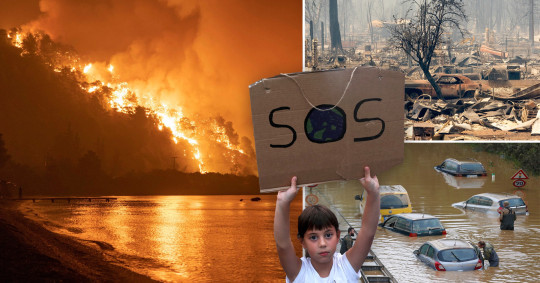A damning new United Nations report released today, August 9, has warned countries that humans are unequivocally driving global warming, with devastating impacts already seen around the world.
The assessment comes as wildfires ravaged parts of Greece, Italy, US, Canada in recent weeks, painting a picture of the impact of burning fossil fuels and deforestation.
The UN report warns that the future of the world is bleak if it fails to rapidly tackle the crisis.

While the Earth’s climate does change naturally, scientists say the world is warming at a rate unprecedented in at least 2,000 years.
Global warming is driving the deoxygenation, acidification, and rising temperatures of the sea, affecting its ecosystems and the circulation which drives weather patterns.
Human-caused climate change is already resulting in extreme weather changes, with more heatwaves, heavy rain, droughts and tropical cyclones, the UN report finds.
The report says mankind is very likely the main driver of melting glaciers, warming oceans and rising sea levels.
The report, which draws on more than 14,000 scientific papers, is described by UN secretary-general Antonio Guterres as a ‘code red for humanity’.
From now till 2041, the world will reach or exceed temperature rises of 1.5°C – a limit countries have pledged to avoid the most dangerous consequences of global warming, the report says.
Hitting this number could cause sea levels to rise by at least 11-22 inches by 2100, but the impact could be even worse if emissions remain high.
Without fast and deep reductions in greenhouse gases, temperatures are expected to exceed both the 1.5°C and 2°C limits set in the Paris climate treaty by the mid 21st century.
Every 0.5°C increase leads to a worsening of heatwaves, droughts, flooding and heavy rain, the report adds.
One of the report’s lead authors, Dr Tamsin Edwards, said: ‘Unless there are immediate, rapid and large-scale reductions in greenhouse gas emissions, the 1.5°C target will be beyond reach.’
Cities are at risk as the climate warms, experiencing hotter temperatures in heatwaves and flash flooding from heavy rain.
The study also warns that unlikely events such as ice sheet collapses, abrupt changes to ocean circulation – which drives weather patterns – and much higher warming cannot be ruled out.
However, the report says that humanity still could make a change for the better if it takes action now.
The IPCC’s most optimistic scenario describes a world where global CO2 emissions are cut to net zero around 2050. Societies switch to more sustainable practices, with focus shifting from economic growth to overall well-being. Investments in education and health go up. Inequality falls.

